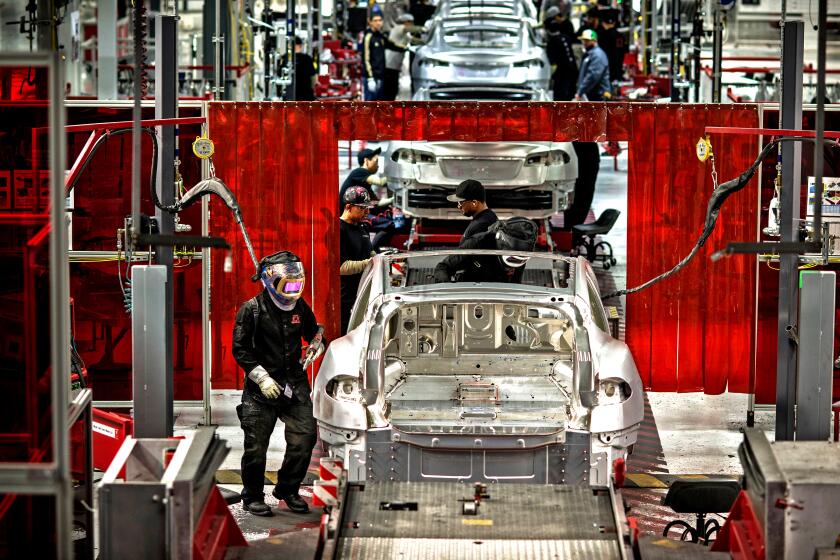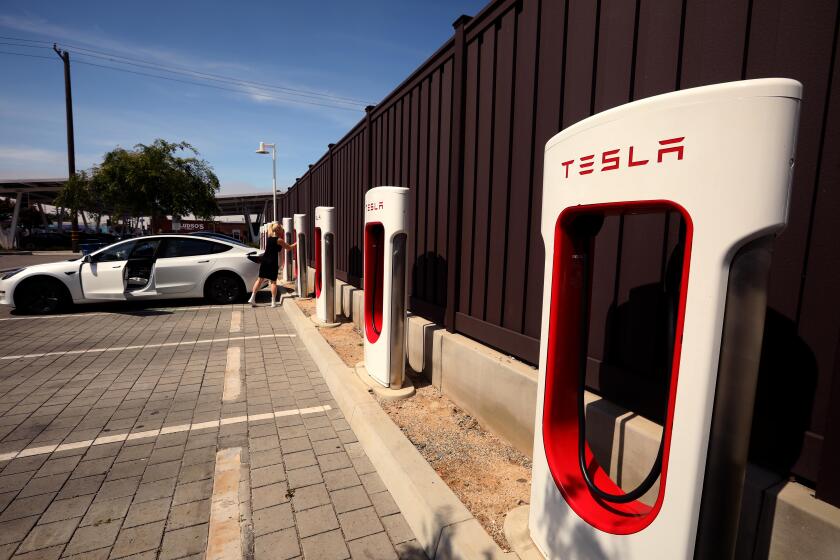Rift Splits Leaders of UAW Local : ‘Team-Concept’ Backers Undercut Beltran, Hard-Line Chief of Unit
When thousands of United Auto Workers delegates gather in Anaheim next Sunday for the union’s national convention, Pete Beltran will be just an observer. He has never been comfortable in that role.
Beltran, president of UAW Local 645 in Van Nuys, says he has marched, picketed and fought for the working class all his life, bucking General Motors and, at times, the national union.
Lately, however, he has been frustrated. Beltran was stung by GM’s announcement early last month that it soon will lay off 2,190 workers indefinitely at its Van Nuys assembly plant.
Slate Supports ‘Team Concept’
Then, on April 22, the rank and file snubbed him. Union members, many of them worried that the layoff could be a prelude to the eventual shutdown of their plant, elected a slate of seven convention delegates who support the “team concept,” a GM-backed production method styled after Japanese techniques.
Beltran, who adamantly opposes the idea, finished ninth in the voting. It was the first time the local has not given its president voting power at a national convention. Worse yet, as far as Beltran is concerned, negotiators for the local late last week reached a tentative agreement with GM that could bring the team concept to the Van Nuys plant.
Those familiar with the local say Beltran’s apparent setbacks reflect a rejection of his old-school, hard-nosed stand against any sort of union concessions. They say it was a victory for the younger, more conciliatory unionists now dominating the labor movement.
The recent developments also would seem to signal the waning of Beltran’s career as a union politician, although observers say it is too early to count him out.
Beltran, 46, the son of Mexican-American parents who worked on a cotton ranch, has suffered setbacks before. In 1984, for example, workers in the local ratified by almost 2 to 1 a national contract that Beltran had outspokenly opposed.
Beltran, however, now faces a powerful and self-assured challenger in Ray Ruiz, 31, who as the union’s shop chairman led the winning slate of convention delegates. Ruiz, who is also the local’s bargaining committee chairman, and Bruce Lee, western regional director of the UAW, constituted the negotiating team that agreed on the team-concept proposals last week.
Peter Zapata Beltran was born in El Paso, Tex., and grew up in San Fernando. (Emiliano Zapata, for whom he is named, was a Mexican revolutionary and agrarian reformer.) Beltran graduated from high school in 1958 and, like many of the workers he represents, his first job out of school was at the GM plant in Van Nuys.
Inspired by Walter Reuther
In 1966, Beltran attended his first UAW convention and became inspired by the words of the late Walter Reuther, the militant president of the UAW from 1946 to 1970.
Beltran moved to Salinas in 1975 to become regional director of the California Agricultural Labor Relations Board, an arbitration agency. Frustrated by funding problems, he returned to the assembly line in Van Nuys a year later, working in the hard-trim department, where such parts as dashboards and mirrors are installed. He soon re-entered the local’s politics, was elected president in 1978, and has held the job ever since.
Beltran discounted his recent loss in the convention delegate election. He said he did not campaign for a seat, and noted that only 1,800 of the 4,300 eligible union members voted.
Moreover, his three-year term as president does not end until June, 1987, and union officials from both camps say Beltran easily can regain support by then. Observers say that much of Beltran’s opposition might be short-lived, inspired by the big layoff now scheduled for July 7.
All the same, the delegate election has taken its toll on Beltran.
‘Hurt Bad’
“Pete’s been hurt bad,” said Rodolfo Acuna, a Chicano studies professor at California State University, Northridge, who has followed the local’s politics. “He doesn’t talk about it much. But you can see the pain.”
Rebecca Morales, who teaches urban affairs at UCLA, said Beltran was especially hurt by the local’s recent vote because the convention this year, which will have more than 7,000 delegates, will be held in Southern California, where the Van Nuys factory is the only operating auto plant.
Beltran says he was instrumental in Ruiz’s ascension in the local’s politics and thus feels betrayed.
Beltran, anger mounting in his long face, says: “I supported him. I saw something in him, that he would develop into a good leader. Now he is attacking me unscrupulously.”
Ruiz says he was trained by Beltran at union leadership seminars but does not consider him a mentor. He says he owes his start mainly to Jerry Shrieves, who preceded Ruiz both as shop chairman and chief negotiator and who now works on the assembly line.
Beltran can be fiery at a rally, but he appears sober and self-effacing in a one-on-one meeting. Ruiz, in contrast, wears lots of jewelry, including a heavy gold chain on his neck. He speaks very quickly, dispassionately rattling off numbers and campaign-like rhetoric.
“People are tired of the old ways,” he said. “They’re questioning Beltran’s credibility. The vote on April 22 was a mandate for a different way of doing business. People want change.”
Rivalries Common
Rivalries between local presidents, whose offices are in union halls, and shop chairmen, who often have closer relations with workers because their desks are on plant floors, are common in the industry, said Paul Schrade, a former western regional director for the UAW.
“People have to come into the union hall to see Pete,” Schrade said. “He can’t possibly have the contacts.”
The most obvious philosophical difference between Beltran and Ruiz is over the team concept. Under such a system, a majority of the plant’s employees work in small groups rather than on a traditional assembly line. GM says team concept improves quality control, in part because it puts pressure on workers to check their own work.
The company also says the system would make the plant more efficient, partly by reducing the number of inspectors that are needed. Before contract changes can be made to introduce the concept, however, a majority of the local’s membership must approve the plan when it comes to a vote this week.
Beltran says the team concept is nothing more than a speedup, or more work in less time from fewer people. He says such a plan would mean the eventual layoff of 15% of the work force. Moreover, he opposes the system because he believes it would break down the seniority system.
“A man who’s been working 20 years, his body’s worn out,” Beltran said. “With this team concept, he’s still humping it on the line with no place to go. I think he’s earned the right to rest.”
GM’s Argument
GM maintains that, without the team concept, elements of which are already in place at one-third of its factories, it cannot keep the plant open. Workers in Van Nuys were told in 1982 that their plant was on the “endangered list” primarily because it is more than 2,000 miles from GM’s Midwestern suppliers and is also far from most of its customers.
Only 13% of about 180,000 Chevrolet Camaros and Pontiac Firebirds made at the plant annually are sold in California.
Beltran, however, says GM sells hundreds of thousands more cars every year in California than it makes in Van Nuys. So, he says, the answer is simply to make a greater variety of cars at the plant, the way it was done in the past.
GM, in fact, is considering an ambitious auto-production plan known as “flex plant” that would enable the Van Nuys plant to adjust quickly to customer demand and make whatever cars are selling best in the Western United States, thus cutting shipping costs. Ruiz thinks the idea is a good one but that it is not enough.
In any case, GM officials say they can make no commitments to keep the plant open beyond 1989. That is when the company plans to phase out production of the Camaro and Firebird, most likely in favor of new, lighter models with plastic skins, such as the Pontiac Fiero.
Beltran has been at the forefront of a drive of labor, community, religious and political organizations to keep the factory operating. The plant, which opened in 1947, is the San Fernando Valley’s second-largest corporate employer, with 4,800 workers.
Although he rejects the “militant” label that he is often given, Beltran has threatened a nationwide boycott of GM cars unless the company guarantees to keep the plant open for at least 10 years.
Nevertheless, he has few illusions about his chances for success. Pushing a hand through dark hair blazed with a white streak, Beltran said he has suffered many disappointments, particularly in the recent era of labor concessions.
Numerous Frustrations
His list of frustrations includes the leadership of UAW head Owen Bieber, whom he considers too conciliatory, and the reduction of 500 jobs at the Van Nuys plant in 1983, when GM eliminated a so-called “rolling” relief system that allowed workers to take breaks when they felt tired.
In 1984, Beltran backed an unauthorized walkout aimed at pressuring the company to reach a national contract, instead of separate local ones. One morning, while Shrieves, then chairman of the bargaining committee, urged workers to stay on the line, Beltran directed them out of the building, speaking from the back of a flatbed truck to a raucous gathering.
When a national agreement was reached two weeks later, Beltran asked workers in Van Nuys to vote it down because he believed it did not provide big enough wage increases. The membership, however, rejected Beltran’s pleas.
His disappointments notwithstanding, Beltran said he intends to run for reelection in 1987, then retire the following year, when his 30 years with the union will assure him of a secure pension. Then, he said, he may try to get into city politics. Now, Beltran said, he is fighting almost for the sake of fighting.
“When our people start losing their jobs, they’ll realize it doesn’t make sense to make concessions,” he said.



